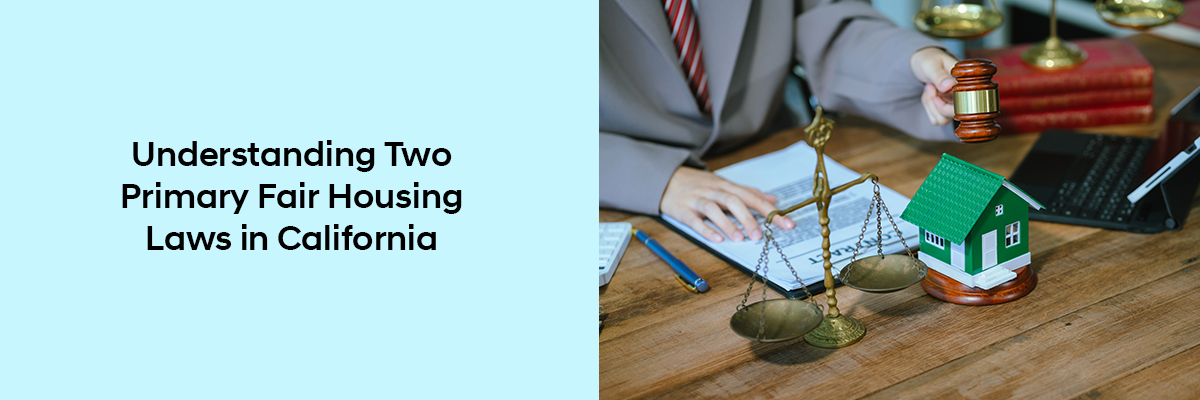Fair housing is a cornerstone of equitable living, ensuring everyone has access to housing without facing discrimination. California, being a state with a diverse population, upholds this principle through stringent housing laws. Two of the primary fair housing laws in California are the Fair Employment and Housing Act (FEHA) and the Unruh Civil Rights Act.
Understanding these laws is crucial for landlords, tenants, and housing providers to ensure compliance and foster inclusive communities.



1. The Fair Employment and Housing Act (FEHA)
Overview
The Fair Employment and Housing Act (FEHA) is one of California’s most comprehensive anti-discrimination laws, enforced by the Department of Fair Employment and Housing (DFEH). It prohibits housing discrimination based on several protected characteristics, including:
- Race or color
- National origin or ancestry
- Religion
- Sex or gender (including gender identity and expression)
- Sexual orientation
- Familial status
- Disability
- Source of income
- Age
Key Provisions
Under FEHA, it is unlawful for housing providers to:
- Refuse to rent or sell housing based on a person’s protected characteristics.
- Set different terms, conditions, or privileges for sale or rental.
- Advertise or make statements indicating a preference or limitation based on protected characteristics.
- Deny reasonable accommodations for individuals with disabilities.
Examples of Violations
- A landlord refusing to rent to a family with children, citing noise concerns.
- A housing provider denying a service animal to a tenant with a disability, despite the property having a “no pets” policy.
Penalties
Violations of FEHA can result in significant penalties, including fines, compensation for damages, and mandatory policy changes for housing providers.
2. The Unruh Civil Rights Act
Overview
The Unruh Civil Rights Act complements FEHA by ensuring equal access to all business establishments, including housing providers. It broadly prohibits discrimination and applies to any arbitrary or intentional exclusion of individuals based on their characteristics.
Protected Characteristics
Similar to FEHA, the Unruh Act protects individuals against discrimination based on:
- Race
- Color
- Religion
- Ancestry
- National origin
- Disability
- Medical condition
- Genetic information
- Marital status
- Sexual orientation
- Gender identity and expression
- Age
Key Provisions
The Unruh Act:
- Applies to all business establishments, including landlords and property management companies.
- Prohibits outright denial of housing services or benefits to individuals based on their protected status.
- Ensures that all persons are entitled to equal accommodations and privileges.
Examples of Violations
- A property management company charging higher deposits for tenants of a certain ethnicity.
- Refusing to show apartments to individuals with disabilities.
Penalties
Violations can result in statutory damages of up to $4,000 per incident, in addition to actual damages and attorney fees.
Importance of Compliance
Compliance with FEHA and the Unruh Civil Rights Act is essential for:
- Avoiding costly lawsuits and penalties.
- Promoting an inclusive housing environment.
- Enhancing the reputation of housing providers.
For more insights into compliance and housing regulations, check out fair housing webinars, for expert resources and guidance.
Tips for Landlords and Property Managers
- Educate Yourself and Staff: Regularly update knowledge about fair housing laws and ensure employees are trained to comply with them.
- Standardize Policies: Use consistent criteria for tenant selection to avoid discrimination claims.
- Accommodate Disabilities: Be open to reasonable modifications or accommodations requested by tenants with disabilities.
- Document Everything: Maintain records of communications, applications, and decisions to demonstrate compliance if questioned.
- Seek Legal Advice: Consult legal professionals to ensure all practices align with state and federal fair housing laws.
Conclusion
Understanding and adhering to California’s Fair Housing Laws is not just a legal obligation but a commitment to creating equitable communities. The FEHA and the Unruh Civil Rights Act provide robust frameworks to combat discrimination and promote inclusivity. For landlords, tenants, and property managers, knowledge of these laws is the first step toward fostering fair housing practices. Staying compliant is not only about avoiding penalties but also about contributing to a just and equitable society.


